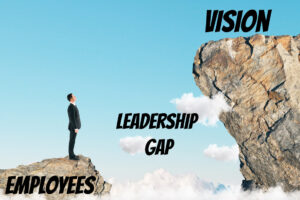Leadership today is not only about achieving results. It is also about guiding people through change while maintaining a sense of stability. A leader must think clearly when conditions shift, communicate with intention when pressure rises and support the team in a way that builds confidence rather than anxiety. Leadership is therefore both a skill and a presence. It asks for maturity, patience and the ability to respond rather than react.
 Leadership development in Oman is becoming more important as workplaces continue to change. According to the National Centre for Statistics and Information, more than 60 percent of Oman’s population is under the age of 35. This creates workplaces with young teams who are learning how to manage responsibility, growth and collaboration. At the same time, Vision 2040 is accelerating national diversification, innovation and long-term economic sustainability. These shifts are influencing what leadership must look like in organisations across the country.
Leadership development in Oman is becoming more important as workplaces continue to change. According to the National Centre for Statistics and Information, more than 60 percent of Oman’s population is under the age of 35. This creates workplaces with young teams who are learning how to manage responsibility, growth and collaboration. At the same time, Vision 2040 is accelerating national diversification, innovation and long-term economic sustainability. These shifts are influencing what leadership must look like in organisations across the country.
Many organisations in Oman already have employees who show early signs of leadership. They are dependable, thoughtful and respected by colleagues. Others seek advice from them because they have a steady voice. These are the individuals who often have the potential to grow into strong leaders.
However, moving from completing tasks to influencing direction is a significant shift. Managing tasks relies on technical knowledge and discipline. Leading others requires judgment, communication and emotional awareness. This change does not happen naturally just because someone has spent more time in an organisation. It develops through deliberate and guided growth.
relies on technical knowledge and discipline. Leading others requires judgment, communication and emotional awareness. This change does not happen naturally just because someone has spent more time in an organisation. It develops through deliberate and guided growth.
In several companies, high-performing employees are promoted into leadership before they are prepared. This results in stress, self-doubt and gaps in how teams are guided. When the transition is supported thoughtfully, emerging leaders feel more confident and teams benefit from clearer leadership.
Many leadership development programs rely heavily on models from standard contexts. These frameworks have value, but they are not always aligned with cultural expectations in Oman where relationships, trust and dignity hold significant influence.
A leader may understand a model of decision-making, yet still feel uncomfortable in a performance conversation because of the importance placed on preserving harmony and respect.
Traditional training also tends to be classroom-based. It provides information but does not always offer opportunities to practice leadership in real situations. A participant may enjoy the session yet return to work without changing behaviour.
Real leadership confidence grows through experience, reflection and feedback.
For example, several Omani organisations, including Oman LNG and Bank Muscat, have adopted mentoring structures where emerging leaders regularly meet with senior leaders. These conversations allow leaders to reflect on real situations rather than hypothetical case studies. This approach has shown positive results in building confidence and clarity.
Leadership development in Oman becomes more meaningful when learning is connected to culture, context and workplace reality.
If an organisation wants more leaders who can step forward with confidence, leadership development must be intentional. Relying on trial and error places too much pressure on emerging leaders and may lead to mistakes that could have been avoided.
Structured leadership development pathways include:
In Oman, some organisations in the oil and gas sector have already embedded such pathways.
For example, leadership rotations are used to expose employees to different work environments and challenges. This broadens perspective and strengthens adaptability.
When pathways are clear, employees understand what leadership means in their organisation and how they can grow into it.
Many emerging leaders in Oman are eager to grow. However, several challenges can slow their progress:
Over reliance on senior direction
Some employees wait for instructions because they do not want to risk making the wrong choice. This reduces initiative. Leaders must learn how to assess situations and decide with confidence.
Discomfort with necessary conversations
Feedback, role clarity and guidance require direct communication. When emerging leaders avoid these conversations, issues remain unresolved.
Balancing relationships with authority
Omani culture values respect, connection and kindness. Leaders must learn how to maintain these values while also setting standards and expectations.
Fear of making mistakes
Mistakes are natural in leadership. When emerging leaders fear them, they hesitate. This hesitation slows team progress.
These challenges are not weaknesses. They are milestones in the leadership journey. When organisations recognise them and provide patient support, leaders grow through them with steadiness.
For leadership development in Oman to be sustainable, learning must be continuous. It cannot be a single workshop. It must influence how people think, communicate and make decisions.
Five practical steps support this:
Define Clear Leadership Expectations
Clarity helps individuals understand what leadership looks like in your workplace.
Provide Opportunities for Real Practice
Leadership develops when individuals experience responsibility in controlled increments.
Support Through Coaching or Mentoring
Guided reflection helps individuals see themselves more clearly and make thoughtful adjustments.
Give Feedback That Is Specific and Respectful
Feedback should address behaviour and outcomes, not personality.
Recognise Progress as Well as Results
Encouragement builds confidence and maintains momentum as skills develop.
When leadership development is intentional, the difference in team behaviour is visible. Communication becomes clearer, collaboration strengthens. Team members begin to take responsibility rather than wait for instructions.
Leaders who remain steady and fair build trust. Trust allows teams to discuss challenges openly and solve problems rather than avoid them. It creates an environment where ideas are welcomed and learning is encouraged. This balance of performance and human understanding supports both results and long-term loyalty.
Leadership development in Oman is not only about skills. It is about building a culture where people are prepared to guide others with confidence and dignity. Many promising leaders already exist within organisations. They require structured development, consistent support and meaningful opportunities to grow.
Investing in leadership today strengthens teams for tomorrow. It supports continuity, resilience and sustainable progress in workplaces across Oman.
To explore how we support leadership development, visit:
🌐 www.theyellowspot.com
📧 info@theyellowspot.com
📞 India: +91 99677 14310 / +91 87792 84314


Blue Arch CHS, Louis School Lane, Four Bungalows, Andheri West, Mumbai – 400053